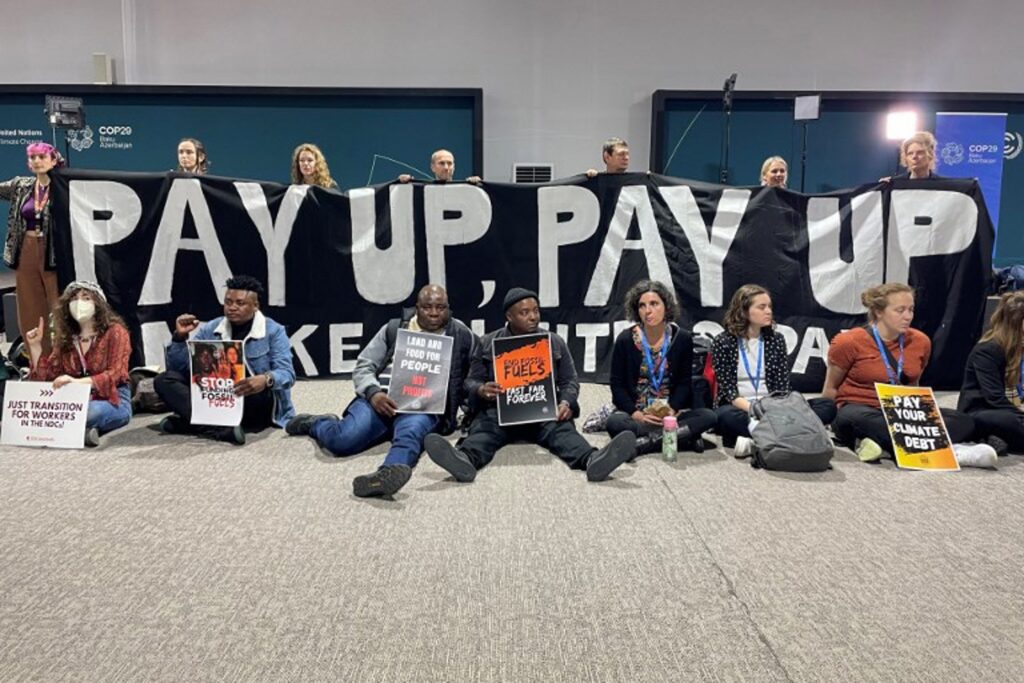The 29th UN Climate Change Conference (COP29) is taking a mid-session break in Baku, Azerbaijan, on Sunday.
Despite securing a technical agreement on carbon credits early on, the results so far have not met the expectations of the most vulnerable countries.
Billed as the "climate finance" COP, the Baku summit (11-22 November) aims to agree on a new collective climate finance goal (NCQG) from developed to developing countries to help mitigate and adapt to climate change.
In 2009, at COP15 in Copenhagen, it was decided that this finance would amount to $100 billion per year starting in 2020, a target reaffirmed by the Paris Agreement. Developed countries eventually met this commitment, albeit two years late, with $115.9 billion in 2022, eroding trust.
Developing countries are now calling for a substantial increase, suggesting annual amounts as high as $1.3 trillion, to address vast needs for energy transition, climate adaptation, and loss compensation.
Developed nations cite budget constraints and propose a multi-layered approach, combining public funding, private investments, and multilateral development bank flows. Western countries, led by the European Union, also insist other nations such as China and Saudi Arabia contribute to climate finance.
Distilling draft agreement
After six days in Baku, negotiators have reduced the NCQG text to 25 pages. Observers believe a viable negotiation base for the ministers’ upcoming discussions would be around 10 pages. The current draft, however, remains complex and filled with multiple options.
This is not unusual, as ministers, including Belgium’s Climate Minister Zakia Khattabi, will arrive in the second week to resolve key issues. Nonetheless, these negotiations are expected to be particularly difficult.
The G20 summit in Brazil, scheduled for Monday and Tuesday, could influence the Baku negotiations. However, contrasting viewpoints may become apparent.
Geopolitical tensions, such as the ongoing war in Ukraine and the Middle East conflict, complicate the situation. Additionally, the potential re-election of climate sceptic Donald Trump casts doubt on the US stance, with the world’s second-largest emitter possibly withdrawing from the Paris Agreement again.
The host, Azerbaijan, has added to the challenges with President Ilham Aliyev’s confrontational statements targeting France, the Netherlands, and various Western entities. Aliyev also controversially referred to oil and gas as “gifts from God,” despite fossil fuels being major contributors to climate change.
Carbon credit win
Despite these issues, Azerbaijan’s presidency of COP29 scored an early success with a preliminary agreement on the technical Article 6.4 of the Paris Agreement. This article addresses a carbon credit mechanism allowing developed countries to fund emission-reduction projects in developing nations.
By the conference’s conclusion on 22 November, COP29 must also confirm commitments made in Dubai last year to transition away from fossil fuels, double energy efficiency, and triple renewable energy uptake. Nearly 200 Paris Agreement parties must renew their Nationally Determined Contributions (NDCs) for emission reductions by February 2025.
NGOs hoped COP29 would signal increased ambition given the climate emergency, but few major emitters have revealed their plans, and Azerbaijan itself has yet to disclose its new NDC.

